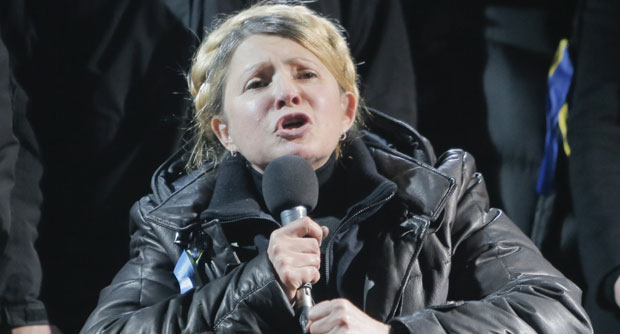Ukraine votes to oust Yanukovych, Tymoshenko walks free

Former Ukrainian prime minister Yulia Tymoshenko addresses the crowd in central Kiev, Ukraine, Saturday, Feb. 22, 2014. Hours after being released from prison, former Ukrainian prime minister and opposition icon Yulia Tymoshenko praised the demonstrators killed in violence this week as heroes. AP
KIEV – The Ukrainian parliament in Kiev voted Saturday to oust a defiant President Viktor Yanukovych and call early presidential elections as jailed opposition icon Yulia Tymoshenko walked free, capping three months of anti-government protests.
Yanukovych vowed not to step down in a television interview from the pro-Russian eastern bastion city of Kharkiv while Tymoshenko urged the pro-Western protesters to keep up their fight that cost nearly 100 lives in the last week.
Appearing in a wheelchair on Independence Square’s main stage to a rapturous welcome from a 50,000-strong crowd, Tymoshenko said: “You are heroes, you are the best of Ukraine.”
The fiery 53-year-old co-leader of the 2004 pro-democracy Orange Revolution then broke down in tears.
“Do not leave Maidan (Independence Square) as long as you have not obtained what you wanted,” Tymoshenko told the crowd.
Article continues after this advertisementThe parliament had earlier ordered the release of Tymoshenko — a former premier and stalwart supporter of close EU ties who remained Yanukovych’s nemesis even when she was sent to prison in 2011 on a seven-year sentence for “abuse of power”.
Article continues after this advertisementThe parliament also stepped into the power vacuum left by Yanukovych’s departure from Kiev by voting to oust the embattled president and setting new elections for May 25.
“This is a political knockout for Yanukovych,” charismatic former-boxer-turned-
“Yanukovych is no longer president.”
But, in the television interview, Yanukovych denounced the “coup” against him and branded his political foes “bandits” — comments that won firm support from his backers in Moscow.
“I am not leaving the country for anywhere. I do not intend to resign. I am the legitimately elected president,” the 63-year-old leader, who took office in 2010, said in a firm voice.
Ukraine’s border control service claimed that aides to Yanukovych tried to bribe border guards to let him fly out of the country on Saturday but he was prevented from leaving.
The army meanwhile issued a statement saying it “will in no way become involved in the political conflict” and the police force declared itself in support of “the people” and “rapid change”.
The tens of thousands of protesters who had occupied the city’s central Independence Square discovered that security forces had all but abandoned government and presidential buildings and that anyone was now free to enter unchallenged.
They and other city residents gawped in awe and anger at the ostentatious luxury Yanukovych had built up inside a private estate near the capital that featured everything from a private zoo to a replica galleon floating on an artificial waterway.
“I am in shock,” said retired military servicewoman Natalia Rudenko, as she looked out over the manicured lawns studded with statues of rabbits and deer.
“In a country with so much poverty how can one person have so much — he has to be mentally sick.”
The US government welcomed Tymoshenko’s release while EU foreign policy chief Catherine Ashton said: “We need a lasting solution to the political crisis. This must include constitutional reform, the formation of a new inclusive government, and the creation of the conditions for democratic elections.”
The president and opposition leaders signed an EU-brokered deal on Friday that included early elections and the formation of a new unity government that appears to have been superseded by Saturday’s events.
British Foreign Secretary William Hague sounded an encouraging note about the “extraordinary developments” in Ukraine.
The developments showed the balance of power in Ukraine swinging in the opposition’s favour and seemingly superseding a Western-brokered pact Yanukovych had signed just a day earlier with the opposition to end the country’s bloodiest conflict since its independence in 1991.
The crisis had erupted in November when Yanukovych had dumped a pact promising closer ties with the European Union in favour of hewing closer to Soviet-era master Russia.
Russia unsettled
The months of Ukrainian protests had escalated into a Cold War-style confrontation, pitting attempts by the Kremlin to keep reins on its historic fiefdom against EU and US efforts to bring the economically struggling nation of 46 million into the West’s fold.
In a statement, German Foreign Minister Frank-Walter Steinmeier called Saturday on Ukrainian political leaders to do everything to maintain the “the territorial integrity” of their country.
And Ashton said: “The European Union expects everyone in Ukraine to behave responsibly with a view to protect the unity, sovereignty, independence and terrirorial integrity of the country.”
Polish Prime Minister Donald Tusk said Saturday that there existed forces threatening the territorial integrity of Ukraine without specifying what they were.
Ukraine is divided between the Russian-speaking east and a nationalist Ukrainian speaking west.
Russia’s foreign ministry accused the opposition of “submitting itself to armed extremists and looters whose actions pose a direct threat to the sovereignty and constitutional order of Ukraine”.
Yanukovych’s ruling Regions Party, that had previously pushed Ukraine closer toward Russia, stood in disarray amid mass defections by lawmakers to opposition ranks.
More than 40 lawmakers had already quit the Regions Party — once in control of 208 votes in the 450-seat Rada — since the deadly unrest first erupted on Tuesday.
Deputies also named Tymoshenko ally Arsen Avakov as interior minister in place of Vitaliy Zakharchenko — a figure hated by the opposition who is blamed for ordering the police to open fire on unarmed protesters.